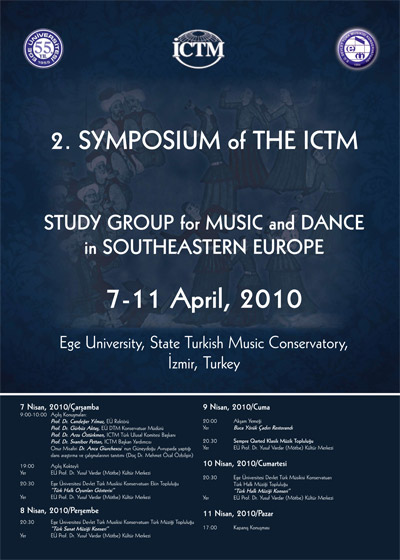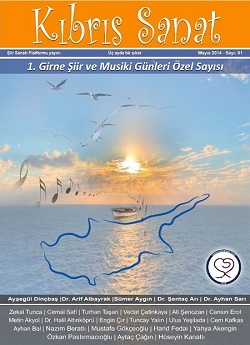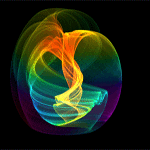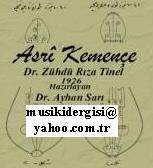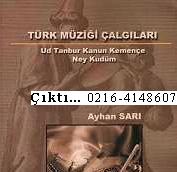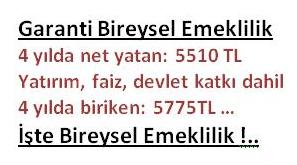Güneydoğu Avrupa Müzik ve Dans Çalışma Grubu -ICTM- Sempozyumu…
Toplam Okunma: 4660 | En Son Okunma: 21.11.2024 - 18:21
 E.Ü. Devlet Türk Musikisi Konservatuvarı, uluslararası önemli bir müzik buluşmasına ev sahipliği yapyor. 2. Uluslararası Güneydoğu Avrupa Müzik ve Dans Çalışma Grubu(ICTM) Sempozyumu kapsamında halk kültürü konusunda uzman yaklaşık 70 bilim insanı İzmir’de buluşuyor. Sempozyumda “Halk gösterilerinin müzik ve dans anlayışı ve uygulamaları üzerinde etkisi” ile “Müzik ve dansta eğitim sistemleri” ana konuları çerçevesinde bildiriler yer alıyor. 7 - 10 Nisan 2010 , EÜ DTMK Bornova … Sempozyum Programı:
E.Ü. Devlet Türk Musikisi Konservatuvarı, uluslararası önemli bir müzik buluşmasına ev sahipliği yapyor. 2. Uluslararası Güneydoğu Avrupa Müzik ve Dans Çalışma Grubu(ICTM) Sempozyumu kapsamında halk kültürü konusunda uzman yaklaşık 70 bilim insanı İzmir’de buluşuyor. Sempozyumda “Halk gösterilerinin müzik ve dans anlayışı ve uygulamaları üzerinde etkisi” ile “Müzik ve dansta eğitim sistemleri” ana konuları çerçevesinde bildiriler yer alıyor. 7 - 10 Nisan 2010 , EÜ DTMK Bornova … Sempozyum Programı:
UNESCO’ya bağlı öncü bir kuruluş olan Uluslararası Geleneksel Müzik Konseyi Güney-Doğu Avrupa Müzik ve Dans Çalışma Gurubu’nun öncülüğünde ilkini 2008 yılında Makedonya’da gerçekleştirdiği sempozyumun ikincisi İzmir’de düzenleniyor.
Ege Üniversitesi Devlet Türk Musikisi Konservatuvarı’nın ev sahipliğinde düzenlenecek sempozyumda “Halk gösterilerinin müzik ve dans anlayışı ve uygulamaları üzerinde etkisi” ile “Müzik ve dansta eğitim sistemleri” ana konuları çerçevesinde bildiriler sunuluyor.
70 bilim insanının buluşacağı etkinlik 7 Nisan’da başlayacak ve 10 Nisan Cumartesi gününe kadar devam edecek. Sempozyum boyunca gündüz bilimsel oturumlar devam ederken, akşam da, Halk oyunları gösterileri, Türk Sanat ve Türk Halk Müziği konserleri düzenleniyor.
P R O G R A M
ICTM Güneydoğu Avrupa Müzik ve Dans Çalışma Grubu Sempozyumu
Müzik ve Dansın Çalışma Grubunun II. Buluşması
7–11 Nisan 2010-İZMİR
Ege Üniversitesi Kültür ve Sanat Salonu
ICTM STUDY GROUP ON MUSIC AND DANCE IN SOUTHEASTERN EUROPE
Second Meeting Of The Study Group And Symposium Of Music And Dance,
7-11 April 2010 – Izmir, Turkey Ege University Culture & Arts Hall
Wednesday, 07 April 2010
9:00 – 10:00 Opening ceremony
Welcoming addresses by:
Prof. Dr. Candeğer Yılmaz, Rector of the Ege University
Prof. Dr. Gürbüz Aktaş, Director of the D.T.M. Conservatory
Arzu Öztürkmen, Liaison officer of ICTM in Turkey
Announcement of the guest of honor Dr. Anca Giurchescu
10:00 – 11:30 Session 1
Topic: How do public presentations affect perceptions and practices of music and dance? Regional and national experiences
1. Ardian Ahmedaja, Austria
“About the impact of researchers and individual artists on public presentations
of music and dance in Albania”
2. Victor A. Friedman, USA
“Public Presentations, Perceptions, and Practices of Chalgija Music in the Republic of Macedonia Today”
3. Jane Sugarman, USA
“Life and Art: Commercial Folklore Videos and Musical Practices among Prespa Albanian Immigrants”
11:30 – 12:00 Coffee break
12:00 – 13:30 Session 2
Topic: How do public presentations affect perceptions and practices of music and dance? Regional and national experiences
1. Ivanka Vlaeva, Bulgaria
“Strategies of the International Folk Festivals in Bulgaria in the last two decades”
2. Mladen Marković, Serbia
“The Trumpet Festival in Guča as a Source and Main Stage for a New Brass Tradition in Serbia”
3. Liz Mellishm & Nick Green, UK
“Public presentations, regional perceptions and dance learning processes in 21st century Romanian Banat”
13:30 – 14:30 Lunch
14:30 – 16:30 Session 3
Topic: Educational systems of music and dance (learning and teaching processes)
1. Lozanka Peycheva, Bulgaria,
“Different educational systems for transmission of folk music in Bulgaria”
2. Gueorgui Harizanov, Bulgaria
“Learning, Mastering and Teaching Traditional Music”
3. Gergana Panova-Tekath, Bulgaria/Germany
“Teaching of Bulgarian Folk Dances to amateur and professional dancers from Bulgaria and Germany”
4. Ventsislav Dimov, Bulgaria
“Images of Balkan musical traditions in textbooks on music from Bulgaria”
16:30-17:00 Coffee break
17:00 – 18:30 Session 4
Topic: Educational systems of music and dance (learning and teaching processes)
1. Belma Kurtisoglu, Turkey
“Teferic-s: Educational System of Musical and Dance Experiences”
2. Özlem Doğuş Varli, Turkey
“The prosess of education and learning the art of music and dance from the rural area to the city: while going from Trabzon to North Cyprus, from Afyon to Istanbul”
3. Mehmet Ocal Ozbilgin, Turkey
“Davul Çaldirma tradition in Akçaalan village, Gediz county, Kütahya - An example for the teaching and learning process of traditional dances in the rural area”
19:00 Cocktail
Place: Ege University Anatolian-Balkan Traditional Costumes Museum
Thursday, 08 April 2010
9:00 – 10:30 Session 1
Topic: Educational systems of music and dance (learning and teaching processes)
1. Dimitrije O. Golemović, Serbia
„Is the scholl right place to learn traditional folk music?“
2. Angela Rodel, USA
“Far from Black and White: The Role of the Piano in Bulgarian Folk Singing Pedagogy”
3. Hande Sağlam, Turkey/Austria
“New educational borders through bi- or multimusical Students at the University of Music and performing Arts Vienna”
10:30 – 11:00 Coffee break
11:00 – 13:00 Session 2
Topic: Educational systems of music and dance (learning and teaching processes)
1. Olivera Vasić, Serbia
“Teaching Traditional Dances in Serbia in the Last Hundred Years”
2. Ferruh Ozdincer, Turkey
“Folk dance training (education) methods in Turkey”
3. Muzaffer Sümbül, Turkey
“A General View to Staging Process of Turkish Folk Dance of Adana Provinces from Folkhouse (Halkevleri) to Nowadays“
4. Atilla Coşkun Toksoy, Turkey
”An Elementary Look at the Folk Dance Education in Primary Schools”
13:00 – 14:00 Lunch
14:00 – 16:00 Session 3
Topic: How do public presentations affect perceptions and practices of music and dance? Regional and national experiences
1. Dorit M. Klebe, Germany
“Berlin Carnival of Cultures” – A Challenging Platform for Public Presentations of Music and Dance Performances for the Turkish Community?
2. F. Merve Eken Küçükaksoy, Turkey
“Transition of a Cultural Performance: A Focus on Musical Gatherings in Kemaliye”
3. Ahmed Tohumcu, Turkey
“A Methamorphosis story: Sema”
4. Rodna Velichkovska, Macedonia
“Public presentation of the traditional harvesting customs and singing in Macedonia”
16:00 – 16:30 Break
16:30 – 18:30 Session 4
Topic: How do public presentations affect perceptions and practices of music and dance? Regional and national experiences
1. Iva Niemčić & Joško Ćaleta, Croatia
„Public Practice vs. Personal Narratives – the Example of Music and Dance Traditions of Boka Kotorska“
2. Jakša Primorac, Croatia
“Dalmatian Klapa Singing in North Adriatic and Dinaric Regions of Croatia”
3. Velika Stojkova Serafimovska, Macedonia
“Keeping Tradition Up To Date”
4. Ian MacMillen, USA
“Tamburaši of the Balkanized Peninsula: Public Concerts as International and
Interethnic Connections in Croatia and its Intimates”
20.30 State Turkish Music Conservatory Turkish Folk Dances Show
Place: Ege University Campus Cultural Center - Mötbe Hall
Friday, 9 April 2010
9:00 – 11:00 Session 1
1. Gordana Blagojević, Serbia
“From media on the street and vice versa: hip-hop dance in Belgrade today”
2. Sonja Zdravkova Dzeparovska, Macedonia
“Methods of dance education”
3. Franc Križnar, Slovenia
“Trombonist, composer and conductor Vinko Globokar (b 1934): the artist and/or charlatan?”
4. Danijela Ilić, Serbia
“The influence of thematic folklore material on the development of new suite form in Serbia”
11:00 – 13:00 Lunch
Excursion To Ephesus Ancient City
As of of the Twelve Ionian Leagues in Classic Greek times and one of the largest cities during the Roman Empire, the site of Ephesus has been continuously inhabited for over 8.000 years. Ephesus is home to the fully excavted Library of Celsius, Temple of Hadrian, and a spectacular amphitheater with a seating capacity of 40,000. Ephesus is also famous for it’s Temple to the Goddess Artemis, Basilica of St. John, and House of the Virgin Mary, which is thought to be the last resting place of the Mother of Christ . Today, Ephesus is located in the Turkish town of Selcuk, just one hour by bus from the EGE University Campus.
13:00 – 15:00 Session 2
1. F. Reyhan Altinay, Turkey
“Functionality Of Traditional Music And Dance, Revival Of Cultural Identity: In The Context Of Immigrants, Religious And Traditional Communities In Izmir”
2. Gozde Colakoglu, Turkey
“The Symbolic Trigon of the Island of Crete: Lyra, Lute and Dance”
3. Huseyin Yaltirik, Turkey
“An Investigation On Two Folk Dances Telling The Seasonal Transition In The Context Of Imitation Among The Yoruks Living In Western Anatolia”
4. Melis Süloş, Turkey
“Restaging the Revolution”
15:00-15.30 Coffee Break
15:30 – 17:30 Session 3
1. Gani Pekşen, Turkey
“The Oral Tradition Of Life Academy: Mekteb-I Irfan”
2. Banu Acikdeniz, Turkey
“Masculine Silhouettes: Representations of Masculinity within Dance Forms of
Zeybek and Zeibekikos”
3. Nesibe Özgül Turgay, Turkey
“The Similarities and Differences between the Immigrant Songs from Both Sides of the Aegean”
4. Ayhan Erol, Turkey
“From the Experience of Authenticity to the Authenticity of Experience in the Alevi Musical Practices”
Saturday, 10 April 2010
9:00 – 11:00 Session 1
Topic: Educational systems of music and dance (learning and teaching processes)
1. Jasmina Talam & Tamara Karača-Beljak, Bosnia and Herzegovina,
„New Bosnian Ethnomusicology: Perspectives and Challenges“
2. Mirjana Zakić and Selena Rakočević, Serbia
„Institutionalizing traditional music and dance. A case study of post-Yugoslav Serbia“
3. Panikos Giorgoudes, Cyprus
“Cyprus Music: The case of uttm.org”
4. Amra Toska, Amila Čengić, Mirza Kovač & Edib Krzić, Bosnia and Herzegovina
„Challenges of new forms of ethnomusicology research and fieldwork in transition countries: Examples from Bosnia and Herzegovina“
11:00 – 12:30
Business meeting of ICTM Study Group on
Music and Dance in Southeastern Europe
12:30 – 13:00 Coffee Break
13:00– 14:30 Session 2
1. Alma Bejtullahu, Austria
“Three Wars and Two Regimes Later: Public Presentations of the National Ensemble of Songs and Dances “Shota”
2. Daniela Ivanova-Nyberg, Bulgaria/USA
“It is More Exiting to Dance in Front of an Audíence” Horo Folk Dance Club Repertoire Today”
3. Zdravko Ranisavljevic, Serbia
“The stage performance and the process of “nationalizing” dance patterns The case of the kolo in three patterns in the repertoire of the Serbian National Ensemble “Kolo””
14:30 – 15:30 Lunch
15:30 – 17:30 Session 3
1. Branka Kostic -Markovic, Macedonia
“Television and Its Role in a New Perception of Macedonian Music Folklore”
2. Elsie Ivancich Dunin, USA/Croatia
“Romani dance and music programming on Macedonian national television”
3. Jaynie Aydin, Turkey
“The Folk Essence of Modern Turkish Belly Dance: A DVD Presentation”
4. Z. Gonca Girgin Tohumcu, Turkey
“From a Cultural Performance to an Art Production: Rom/Gypsy Dancing Bodies”
17:30-18.00 Coffee Break
18:00 – 19:30 Session 4
Timothy Rice, USA
Film showing and discussion
“May you have courage in your life”: A Bulgarian and American musical story”
20.00 State Turkish Music Conservatory Traditional Art Music Concert
Ege University Campus Cultural Center - Mötbe Hall
(Prof. Dr. Yusuf Vardar-Mötbe-Kültür Merkezi)
Sunday, 11 April 2010
9:30 – 11:00 Session 1
1. Ivona Opetcheska Tatarcevska, Macedonia
“The Idea behind Our Folk Dances”: Public narratives about the folk dances in Macedonia”
2. Urša Šivic, Slovenia
“The Double Performing Standards of Musicians: the Case of Slovene Ensemble’s Performance of Vocal and Instrumental Traditional Music”
3. Elka Tschernokoshewa, Germany
“How does Balkan music form life in Germany”
11:00 – 11:30 Coffee Break
11:30 – 13:30 Session 2
1. Carol Silverman, USA
“Representation, Sexuality, and Multiculturalism: Esma Redžepova as Mediator and Collaborator”
2. Rosamaria Cisneros-Kostic
“Does it end with Gypsy/Roma Women?’: Documentary films on Flamenco as Political Art in Franco’s Spain”
3. Speranţa Rădulescu, Romania & Anca Giurchescu, Denmark/Romania
“Music and Dance of Pan-Balkan (and Mediterranean) fusion. The case of the Romanian “manea”
13:30 – 14:30 Lunch
19:30 Closing ceremony
20.00
State Turkish Music Conservatory Traditional Folk Music Concert
Ege University Campus Cultural Center - Mötbe Hall
Prof. Dr. Yusuf Vardar-Mötbe-Kültür Merkezi
